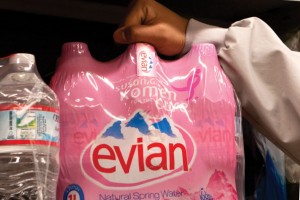Links found between commonly used chemical and likelihood of breast cancer

Conducted by the Swiss Institute for Experimental Cancer Research, the study concluded that the widely-used chemical BPA alters the development of mammary glands, thus leaving the breast vulnerable to cancer. However, the study includes a disclaimer that said the plastic doesn’t directly cause breast cancer.
The study released early in October in the scientific journal Molecular Endocrinology informs readers to be wary of commonly-used food products containing BPA — from soup cans to plastic soda bottles. Cancer-prevention groups encourage shoppers to avoid those products and instead choose reusable glass or stainless steel bottles, or to use soup from cartons instead.
The researchers introduced BPA to the drinking water of breeding mice. Female mice born from BPA-consuming parents were transferred to a BPA-free environment and studied over time.
The mammary glands of the mice that experienced the chemical in the womb and through breast milk had an increased sensitivity to progesterone, a hormone linked to breast cancer. Researchers also found that the offspring of BPA fed mice experienced 1.5 times more cells in their milk ducts than those bred by non-BPA fed mice.
“While we cannot extrapolate these results directly from mice to humans, the possibility that some of the increase in breast cancer incidence observed over the past decades may be attributed to exposure to BPA cannot be dismissed,” said Cathrin Brisken, MD, of the Swiss Institute for Experimental Cancer Research, and one of the co-authors of the study.
Steve Hentges, spokesman of American Chemistry Council, a plastic industries lobbying group, focuses on the authors’ claim that the study does not show a direct link between BPA and breast cancer.
“Regardless of the experimental limitations, the relevance of the findings to breast cancer in humans is uncertain,” he said in a report published last month by the investigative reporting Web site California Watch.
The use of plastic bottles is a typical sight in the City Café on Ocean Campus, where Rachel Fisiiahi, 18, and Jessica Vosaniyaqona, 21, conversed over two bottles of water.
“I’m looking at my bottle and wondering if I want to drink it now,” said Vosaniyaqona, after learning of the study.
For non-profit groups like Breast Cancer Fund, the research furthers their aim to eliminate cancer-causing chemicals and sources. Program coordinator Connie Engel said BPA has been a target of their organization, as it is a hormone manipulator that increases levels of estrogen and progesterone.
The study, said Enegel, is also different from ones performed in the past.
“It’s an important piece. Past studies have looked at BPA injection, but data here is more analogous as the mice were fed through food cans containing BPA, like humans do,” said Engel. “Mice and humans follow essentially the same mammary gland development, so the similarities are important.”
The chemical has long been the source of many health studies which have found correlations with obesity, sexual dysfunction, heart disease, thyroid dysfunction and abnormal brain development among infants. The plastic is banned from baby bottles in the European Union and in Canada.
Through the Toxin Free Infants and Toddlers Act California, lawmakers have successfully banned the use of BPA in baby bottles and sippy cups after July 1, 2013. An analysis of the bill stated that the chemical has been linked to hyperactivity, birth defects and impaired learning, but efforts to ban BPA have been fought by grocery and chemical industry lobbyists.
“Ask your cafeteria to go green, and go to farmer’s markets instead of buying canned foods,” said Engel.
It wasn’t until the 1930’s that BPA’s effects were noted. It its still permitted by the FDA for use in foods at very low levels.

Comments are closed.